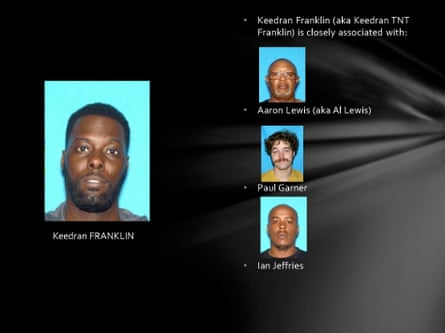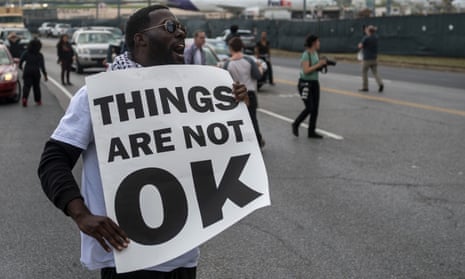Memphis activist and protester Keedran Franklin already knew the city’s police had an eye out for him.
At local demonstrations, he’s frequently the first person to be arrested. Sometimes officers sit outside his office in unmarked cars waiting for him to leave, Franklin and his attorney Scott Kramer claim. In public, officers who Franklin has never met come up to him and address him by name, Kramer said, “just to let [Franklin] know that they [the officers] all know who he is.”
But after all that, Franklin was still surprised to see just how deep it went.
A trove of documents released by the city of Memphis late last week appear to show that its police department has been systematically using fake social media profiles to surveil local Black Lives Matter activists, and that it kept dossiers and detailed power point presentations on dozens of Memphis-area activists along with lists of their known associates.
No name is more prevalent in the documents than that of 32-year old Franklin, who has become a veteran organizer with the Memphis Coalition of Concerned Citizens and Black Lives Matter causes over the past few years. It’s “saddening” and “a little scary at times,” he told the Guardian, while finding a touch of humor in it too. “Doing all that for this ol’ poor black guy from south Memphis,” Franklin laughed.
The surveillance project was operated through the Memphis police department’s office of homeland security, which officials said was “originally designed to deal with threats to the MPD or Memphis in general”. But in a deposition for a lawsuit filed by the American Civil Liberties Union over the information gathering, officials said it had “retooled” around 2016 due to the groundswell of policing-related protests and began to focus on “local individuals or groups that were staging protests”.
This included the publication of daily joint information briefings on potential protests and known protesters. According to the ACLU’s lawsuit, the briefings regularly included information about meetings on private property, panel discussions, town halls, and even innocuous events like “Black Owned Food Truck Sunday”.
A good deal of that information appears to have been obtained by a fake MPD Facebook profile for a “Bob Smith”, which the ACLU said was used “to view private posts, join private groups, and otherwise pose as a member of the activist community”.
In once case the Bob Smith pseudonym was apparently used to collect information on all the Facebook users who had liked a post made by an activist referencing Saul Alinsky, a radical-left organizer and frequent conservative boogeyman.
The briefings, which contained sensitive information including photographs, dates of birth, addresses, and mental health histories were distributed beyond the department according to the ACLU lawsuit, to a number of local businesses including the region’s largest employer FedEx and the county school district.
MPD also produced powerpoint slideshows for police trainees on protesters like Franklin and known close associates, including some who had never been arrested at any protest or accused of breaking any laws.

Police surveillance of activists has a history in Memphis dating back to the civil rights era and Martin Luther King’s fateful last trip to the city on behalf of striking sanitation workers in 1968. Police at the time were not only spying on the labor organizers behind the strike, but on over 30 community organizations including the local university’s black student union and the National Council of Churches. Mixed in with the student, faith-based and racial justice groups on the watch list were standard-bearers of racist terrorism like the Ku Klux Klan and the White Citizens Council.
By 1976 the spying program had amassed a budget of more than $1m a year (over $4m today). That same year, University of Memphis student Eric Carter, who was active in anti-war organizing, discovered that his roommate was actually an undercover officer collecting information on his activities.
Despite ham-handed attempts to destroy evidence at a city-owned incinerator, the resulting ACLU lawsuit concluded with the signing of a consent decree – effectively a court order– substantially curtailing the city’s freedom to surveil and spy on citizens with relation to their political beliefs.
It read in part: “The city of Memphis shall not, at any lawful meeting or demonstration, for the purpose of chilling the exercise of First Amendment rights or for the purpose of maintaining a record, record the name of or photograph any person in attendance.”
The city argues that the surveillance techniques its using to keep tabs on Franklin and others are not bound by the consent decree because they aren’t aimed at curtailing free speech, and that the ACLU’s interpretation is “out of step” with the realities of modern policing. An MPD spokesperson also said they were “not aware” of officers waiting outside Franklin’s work.
“The consent decree was drafted before the internet – before smartphones, body cameras, or any type of digital cameras,” said Memphis chief legal officer Bruce McMullen in a statement. “MPD’s observance of posts made on social media is consistent with best practices of law enforcement agencies across the country and is nothing more than good police work.”
Bur for Franklin, that “good police work” feels like little more than obtrusive state surveillance, and the stress keeps him up at night. “I’m always just being overly cautious now,” Franklin said. “If I slip, that’s gonna be my last time slippin.”
Carrying a firearm, for example: Franklin said that’s out of the question. He said he goes out of his way to make sure friends, associates and even the police know that he is never carrying a weapon. Franklin fears that if police think he’s armed, he’ll be shot.
“I feel like even me running is a death sentence,” Franklin said. “It’s now clicked in my mind, if I run they’re going to ‘Walter Scott’ me,” he said, referring to the fatal police shooting of a South Carolina black man from behind in 2015.
“Me coming out of my house is a possible death threat for me at this point,” Franklin said.
The ACLU’s suit is slated to be heard by a judge on 20 August.
